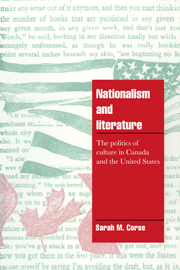Book contents
- Frontmatter
- Contents
- List of tables
- Acknowledgments
- 1 Introduction: cultural fields and literary use
- 2 Nation-building and the historical timing of a national literature in the United States
- 3 Nation-building and the historical timing of a national literature in Canada
- 4 The canonical novels: the politics of cultural nationalism
- 5 The literary prize winners: revision and renewal
- 6 The bestsellers: the economics of publishing and the convergence of popular taste
- 7 Literary meaning and cultural use
- Appendix A The canonical novels
- Appendix B The literary prize winners (1978–1987)
- Appendix C The bestsellers (1978–1987)
- Appendix D Coding sheet
- Appendix E Generic categories
- References
- Index
3 - Nation-building and the historical timing of a national literature in Canada
Published online by Cambridge University Press: 11 May 2010
- Frontmatter
- Contents
- List of tables
- Acknowledgments
- 1 Introduction: cultural fields and literary use
- 2 Nation-building and the historical timing of a national literature in the United States
- 3 Nation-building and the historical timing of a national literature in Canada
- 4 The canonical novels: the politics of cultural nationalism
- 5 The literary prize winners: revision and renewal
- 6 The bestsellers: the economics of publishing and the convergence of popular taste
- 7 Literary meaning and cultural use
- Appendix A The canonical novels
- Appendix B The literary prize winners (1978–1987)
- Appendix C The bestsellers (1978–1987)
- Appendix D Coding sheet
- Appendix E Generic categories
- References
- Index
Summary
Canadian identity is weaker in both the sociohistorical sense of Mexico … and the compactual or covenantal sense of the United States, which historically has required a unified political credo for its immigrant society. More regionalistic than the other two, Canada is still working out the consequences of having had two founding European cultures and of having followed the evolutionary path to state formation in 1867 and subsequent independence
(Earle and Wirth 1995: 3).Although the theoretical argument delineated in chapter 2 holds true for the Canadian case, the specific historical circumstances in Canada generated a very different development pattern for Canadian national literature than that which occurred in the American case. In Canada, several distinctive features of the political situation suppressed the search for and the development of a national literature until the mid-twentieth century.
Early Canadian society faced three powerful threats to the possibility of the national project. First, there was a strong division between English and French Canada, rooted both in historical animosity between the founding societies and in profound differences between anglophone and francophone in religion, language, occupation, orientation to modernity, and economic power. Canada's subnational division between the French and English founding traditions generated an inherent tension in the attempt to construct a unifying, fully national literature. Nationalist sentiment in Canadian history has historically taken a wide variety of forms and referenced many different visions of Canada – visions that are often incompatible (Berger 1970; Cook 1986; Gougeon 1994).
- Type
- Chapter
- Information
- Nationalism and LiteratureThe Politics of Culture in Canada and the United States, pp. 34 - 62Publisher: Cambridge University PressPrint publication year: 1996

